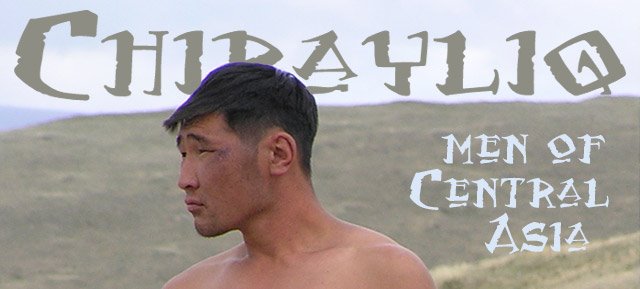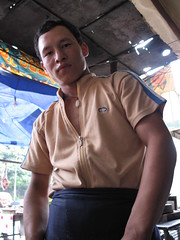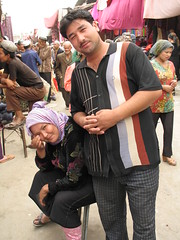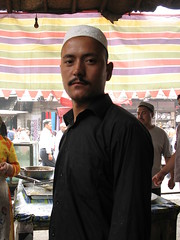Friday, 31 October 2008
Tatarin i Evrei
It's a gloomy time of the year, so we need something cheerful to brighten the day. Here are the molodtsy (good boys) of boy band Kazan Egetläre, singing about the very special friendship between Tatars and Jews - featuring klezmer band Simha.
One of my future projects is to dig up all possible cultural and historical connections between minority peoples in Eurasia, and explore the interaction, positive and negative, between them. Research focuses often on the relation between majority and minority, and other dynamics are forgotten. There are certainly many Russian jokes about Tatars and Jews being rivals (both are stereotypically depicted as shrewd businessmen preying on simple but honest Russians), as in the joke: "When the Tatar was born, the Jew wept".
Cheers to Kazan Egetlere for celebrating, instead of hating!
Sunday, 26 October 2008
Camel polo!
Winter is coming closer. Mongolia has very fierce winters, but they have fun games for the winter to warm you (and your camels) up ...
We have previously covered the sport Ulak tartysh, or "goat grabbing", which is the original form of polo. There is a newer Mongolian variation of polo - Camel polo, in Mongolian Тэмээн поло or Тэмээн бeмбeг (camel-ball). Basically it's polo on camels. The Mongolian Camel Polo Association developed this game in the early 2000's, not least with the aim to help protect the two-humped Bactrian camel, which is becoming very rare. Today only 1,4 million of the world's about 20 million camels are two-humped. The wild Bactrian camel is officially classified as critically endangered - there are only less than a thousand of them. The rest are domesticated, and are used for transportation, wool, milk and meat. And now, also polo!
Flickr user mongolbob are, as far as I can tell, a husband and wife who are English teachers far out in Western Mongolia. Their photos are really fascinating, and they have a few pictures of camel polo.

Camel polo team, originally uploaded by mongolbob

Champion camel herder, originally uploaded by mongolbob

What a handsome pair!, originally uploaded by mongolbob
Also check out SamboJambo's set of photos from a Camel polo game in Dalanzadgad - there are some very nice photos there.
The Siam polo news actually reported about that very game in Dalanzadgad (a bit below the middle of this page):
"The temperature was -18*C, and there was blowing snow and sand as the tournament opened. Over two days, 32 games (64 chukkas) were played on two adjoining sand fields for a spectacular show of Camel Polo. [...] You whip the camel to go very fast and call out the word "Chuu." There are 4 people on a team, and there are no fouls -- anything goes."

This photo is from e-mongol.com, who organise individual tailored trips to Mongolia. I'm sure they can arrange special Camel polo winter trips!
Finally, a photo from the Mongol News Group:, taken by T. Chimgee:

Chuuu!
We have previously covered the sport Ulak tartysh, or "goat grabbing", which is the original form of polo. There is a newer Mongolian variation of polo - Camel polo, in Mongolian Тэмээн поло or Тэмээн бeмбeг (camel-ball). Basically it's polo on camels. The Mongolian Camel Polo Association developed this game in the early 2000's, not least with the aim to help protect the two-humped Bactrian camel, which is becoming very rare. Today only 1,4 million of the world's about 20 million camels are two-humped. The wild Bactrian camel is officially classified as critically endangered - there are only less than a thousand of them. The rest are domesticated, and are used for transportation, wool, milk and meat. And now, also polo!
Flickr user mongolbob are, as far as I can tell, a husband and wife who are English teachers far out in Western Mongolia. Their photos are really fascinating, and they have a few pictures of camel polo.

Camel polo team, originally uploaded by mongolbob

Champion camel herder, originally uploaded by mongolbob

What a handsome pair!, originally uploaded by mongolbob
Also check out SamboJambo's set of photos from a Camel polo game in Dalanzadgad - there are some very nice photos there.
The Siam polo news actually reported about that very game in Dalanzadgad (a bit below the middle of this page):
"The temperature was -18*C, and there was blowing snow and sand as the tournament opened. Over two days, 32 games (64 chukkas) were played on two adjoining sand fields for a spectacular show of Camel Polo. [...] You whip the camel to go very fast and call out the word "Chuu." There are 4 people on a team, and there are no fouls -- anything goes."

This photo is from e-mongol.com, who organise individual tailored trips to Mongolia. I'm sure they can arrange special Camel polo winter trips!
Finally, a photo from the Mongol News Group:, taken by T. Chimgee:

Chuuu!
Mehmet Kurtuluş

The eternal German Krimi-series Tatort has finally broken a barrier: Turkish-German actor Mehmet Kurtuluş plays Cenk Batu, police detective in undercover operations in Hamburg. The first episode is broadcast tonight at 20:15 on NDR. And here's an article at Stern.de: Der erste Türke als Tatort-Kommissar (sensitive readers be warned: the journalists at Stern are not ashamed to use provocative language and make a big deal of the "first token Turk" at Tatort. Spiegel, too, deems it somehow necessary to point out that this is "the end of the döner-cliché". Well, Kurtuluş still plays an integrated Turk going undercover as an unintegrated criminal in order to infiltrate a Turkish "clan", so I don't see how the producers have tried to avoid the clichés...)
 Cenk wins the trust of Deniz, nephew of an ambitious greengrocer/clan leader (played by Burak Yigit).
Cenk wins the trust of Deniz, nephew of an ambitious greengrocer/clan leader (played by Burak Yigit).I found these photos on Spiegel.de. ARD has a nice gallery, too.
 Cenk meets a seductive estate agent, played by Nursel Köse.
Cenk meets a seductive estate agent, played by Nursel Köse.By the way: "Kurtuluş" means liberation.
Wednesday, 22 October 2008
Kazakhs vs. Turkmens!
Faceoff scene from the Kazakh movie Kek (Vengeance, 2006). The Kazakh tribe Aday and the Turkmen tribe Yomut are locked in a vicious circle of blood revenge. There's a love story, too, if you look closely...
Some more clips with spoilers: A summary of key scenes, and a dramatic dombra moment. The film takes up some important motifs in the Kazakh storytelling tradition: the Turkic legend about the mankurt, and the importance of the dombra for (especially masculine) identity, memory and tradition.
Pity about the Russian dub, though...
Some more clips with spoilers: A summary of key scenes, and a dramatic dombra moment. The film takes up some important motifs in the Kazakh storytelling tradition: the Turkic legend about the mankurt, and the importance of the dombra for (especially masculine) identity, memory and tradition.
Pity about the Russian dub, though...
Tuesday, 21 October 2008
Communication

Communication, originally uploaded by floridapfe.
As seen on our previous miniseries "Georgians with pets" (#1 & #2), there's nothing better than handsome men who also take good care of little animals. This photo was taken at the Everland zoo in South Korea, and the little furry creature is a fennec fox.
Monday, 20 October 2008
KINO
1980's... back in the USSR. (All photos from Last.fm)



The guy with the eyebrows on the far right is Yuri Kasparian, currently guitarist in the band U-Piter (Ю-Питер).


We need more Viktor Tsoi. But let's give the other guys in the band a chance, too...

Random Kino facts:
- they started as Garin i giperboloidy in 1981 (named after a 1920's science fiction novel)
- all songs were written by Tsoi, including "Mother Anarchy"
- the band was so popular that after Tsoi's death in 1990, the words “Цой жив!” ("Tsoi is alive!") and “КИНО” spread as graffitti throughout the crumbling Soviet Union
- they were inspired by The Smiths, The Clash, Depeche Mode, Joy Division, Duran Duran, and Vladimir Vysotsky (what, you can see that yourself?!)
Here's an interview with journalist Artem Troitsky about the underground rock scene in the last decades before the fall of the Soviet Union, and what went wrong in the 1990's (in German).
I also found a nice blog about Soviet and post-Soviet underground rock and punk bands: Soveticus. Here's an interview with the guy who keeps the blog. He plays in a punk band himself, tells about anti-fa activism in Russia (almost never mentioned in Western media), and even mentions Swedish "proggare"!



The guy with the eyebrows on the far right is Yuri Kasparian, currently guitarist in the band U-Piter (Ю-Питер).


We need more Viktor Tsoi. But let's give the other guys in the band a chance, too...

Random Kino facts:
- they started as Garin i giperboloidy in 1981 (named after a 1920's science fiction novel)
- all songs were written by Tsoi, including "Mother Anarchy"
- the band was so popular that after Tsoi's death in 1990, the words “Цой жив!” ("Tsoi is alive!") and “КИНО” spread as graffitti throughout the crumbling Soviet Union
- they were inspired by The Smiths, The Clash, Depeche Mode, Joy Division, Duran Duran, and Vladimir Vysotsky (what, you can see that yourself?!)
Here's an interview with journalist Artem Troitsky about the underground rock scene in the last decades before the fall of the Soviet Union, and what went wrong in the 1990's (in German).
I also found a nice blog about Soviet and post-Soviet underground rock and punk bands: Soveticus. Here's an interview with the guy who keeps the blog. He plays in a punk band himself, tells about anti-fa activism in Russia (almost never mentioned in Western media), and even mentions Swedish "proggare"!
Friday, 17 October 2008
Aziz, 19 years old: The future of Germany

The future of Germany
Originally uploaded by dis-clay-muh
The German Ministry for Education and Research is promoting the new BAföG ("Federal Training Assistance Act", i.e. student loan system). One of their ads features Aziz, 19 years old, who states: "The future of Germany needs perspectives: Mine."
Tinet goes: YES!!!!
Indulgent photographer: Ilan Katin.
P.S. Aziz means
Thursday, 16 October 2008
Faces of Xinjiang!
I was trying to put together a "harvest" themed post, but the only nice pictures I have found so far were of the 2006 "Fragrant pear harvest in Xinjiang", as the very Chinese title at peopledaily.com.cn says ...
But then, I came across the Flickr photostream of uninvolved observer, and most particularly his photos from travelling in Xinjiang. As opposed to far too many other male photographers, he doesn't seem to have that much inhibitions against making and even publishing photos of attractive males. Yay!
Click the photos to go to Flickr and see them bigger (and I mean really big) ...
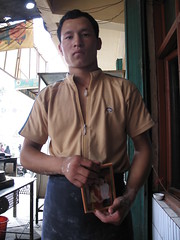
proud
Originally uploaded by uninvolved observer
(There are several more photos of this guy - just click the photos to go see them.)

Final bonus:
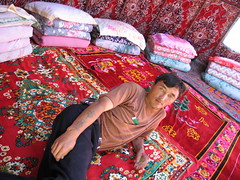
the latest craze: Kazakh yurt porn!
Originally uploaded by uninvolved observer
"the owner of my yurt reclines seductively while we're discussing the price - Hanas Lake (near the Kazakh, Russian, and Mogolian borders) Xinjiang, China"
But then, I came across the Flickr photostream of uninvolved observer, and most particularly his photos from travelling in Xinjiang. As opposed to far too many other male photographers, he doesn't seem to have that much inhibitions against making and even publishing photos of attractive males. Yay!
Click the photos to go to Flickr and see them bigger (and I mean really big) ...

proud
Originally uploaded by uninvolved observer
(There are several more photos of this guy - just click the photos to go see them.)

everyone in Xinjiang is photogenic
Originally uploaded by uninvolved observer
Originally uploaded by uninvolved observer
Final bonus:

the latest craze: Kazakh yurt porn!
Originally uploaded by uninvolved observer
"the owner of my yurt reclines seductively while we're discussing the price - Hanas Lake (near the Kazakh, Russian, and Mogolian borders) Xinjiang, China"
Friday, 10 October 2008
Minusin Tatar, 1909
 SURIKOV Vasily Ivanovich (1848-1916): A Portrait of a Minusin Tatar. 1909.
SURIKOV Vasily Ivanovich (1848-1916): A Portrait of a Minusin Tatar. 1909.Canvas, oils. 38x27 cm. From the permanent collection of the Novosibirsk State Art museum.
The Minusin Tatars are now known as Khakas or Hakass. They are an ethnic minority of Southern Siberia of disputed origins (who isn't?). The Minusin basin was one of the earliest inhabited areas of the region. There are some interesting archaeological finds and inscriptions from this area.
The artist Vasily Surikov was himself born in Siberia. His grandson, famous film director Nikita Mikhalkov, has recently opened a memorial for him in Krasnoyarsk. Some of Surikov's most famous works deal with crucial events in Siberian history, such as the battle between the Cossack hetman Yermak and Kuchum, the last Khan of Sibir.
The situation was a bit more complicated than a simple battle between the fledgling Russian empire and the dwindling rest of the Golden Horde. The descendants of the Khan were later assimilated into Russian nobility under the name Sibirsky. Some claim that Yermak himself was partly of Tatar descent, which might be said of many a Cossack, in spite of the centuries-old animosity between different Cossack and Tatar groups all over the steppe lands. The history of the ethnic minority groups of Russia is a complicated weave of love-hate-relationships...
Wednesday, 8 October 2008
Kute Kosmonauts: Konstantin Kozeyev
 Yesterday I visited the "Honecker-Bunker". Some parts of it are Soviet-made (about 5 % of the whole structure, the guide estimated), and somehow that brought about a sudden memory flashback of the picture on the left, which I recalled that I had saved into the folder "My images/sov" way back in 2001 ...
Yesterday I visited the "Honecker-Bunker". Some parts of it are Soviet-made (about 5 % of the whole structure, the guide estimated), and somehow that brought about a sudden memory flashback of the picture on the left, which I recalled that I had saved into the folder "My images/sov" way back in 2001 ...The gesticulating Cosmonaut is Konstantin Kozeyev, a rookie who in 2001 went on the nine day Andromedé mission on a Союз ТМ-33 to the International Space Station as a cosmonaut-engineer, along with commander Viktor Afanasiev and flight engineer Claudie Haigneré of the European Space Agency. One of their main objectives was to replace the Station's Soyuz vehicle, which serves as the main rescue craft for the Space Station crew in case of emergency (this is done every six months to ensure that the rescue craft is always in top condition). Other important points were to show how the work on the ISS was shifting more and more towards scientific research, and to give the space programmes some general PR. (Read more about the mission.)

Kostya was born 01.12.1967 in Korolyov (then Kaliningrad) outside Moscow, the "cradle of Soviet and Russian space exploration". Both his parents worked at the Rocket and space corporation Energia. After serving in the army, he worked for a while as a speedskating trainer, and then he continued the family tradition and got a job at Energia, at first as a technician, and then, after finishing his studies at the Moscow State Aviation Technological University, as a production engineer, working with training programs for weightless conditions and extra-vehicular activity at the ISS.
In 1996 he was selected as a cosmonaut and began his strenuous training.
(The two photos above are from the photo report section of videocosmos.com.)

Andrei Nikulin from the newspaper Новости космонавтики (Cosmonautics News) interviewed Kostya ahead of his mission in 2001.
This is how Nikulin describes his first impressions of him: "Kostya's unusually open and honest smile unconditionally wins you over, and it goes in a most striking way with his calm, solid and reserved manner. I would even say: modest. Such people you can trust, they will never let you down. Probably these are very valuable qualities for those who are sent up into orbit and whose profession can be defined with one simple word - Cosmonaut. Exactly like that, with a capital letter."
(The above photo with Kostya's cat Varya was made at the interview.)
Friday, 3 October 2008
Migrant workers in Moscow
In the Russian section of BBC News, the photographer Yulia Vishnevetskaya publishes a photoblog with the theme "The Photoalphabet - a humourous attempt at codifying the world using pictures".
The acompanying texts are usually not very illuminating (I guess she is, after all, a photographer and not a writer), and I wish she would include place and date more often, but nevertheless her "Photoalphabet" is quite interesting.

The letter Г ("G") stands for Гастарбайтер, migrant workers. Vishnevetskaya visited some Tajik migrant workers building Moscow highrises.

Playing backgammon in their free hours ...

The workers sleep in their barracks in shifts - while one shift is up working, the other is sleeping in the same bunks.

She notes that they are very friendly folks.

They were friendly, she writes, "not only with me, but also with each other - it's surprising how many of them hold hands, and they don't consider it to be anything improper at all".
Hmm, if Vishnevetskaya has travelled as much as she obviously has, why is she wondering about a thing like this? Holding hands among males without being sexually attracted to each other is very common in many different cultures. Or maybe she is only anticipating a likely Russian reaction to such exotic customs ...?
See more photos in the original post.
The acompanying texts are usually not very illuminating (I guess she is, after all, a photographer and not a writer), and I wish she would include place and date more often, but nevertheless her "Photoalphabet" is quite interesting.

The letter Г ("G") stands for Гастарбайтер, migrant workers. Vishnevetskaya visited some Tajik migrant workers building Moscow highrises.

Playing backgammon in their free hours ...

The workers sleep in their barracks in shifts - while one shift is up working, the other is sleeping in the same bunks.

She notes that they are very friendly folks.

They were friendly, she writes, "not only with me, but also with each other - it's surprising how many of them hold hands, and they don't consider it to be anything improper at all".
Hmm, if Vishnevetskaya has travelled as much as she obviously has, why is she wondering about a thing like this? Holding hands among males without being sexually attracted to each other is very common in many different cultures. Or maybe she is only anticipating a likely Russian reaction to such exotic customs ...?
See more photos in the original post.
Thursday, 2 October 2008
The handsome Russian who saved the World
 On September 26, 1983, the world was saved from nuclear destruction. Little did we know (4 and 2 years old at the time, as inhabitants of Sweden likely to be sacrificed in an attack on western Russia) that lieutenant colonel Stanislav Yevgrafovich Petrov (Станислав Евграфович Петров, born 1939) was the hero of the day.
On September 26, 1983, the world was saved from nuclear destruction. Little did we know (4 and 2 years old at the time, as inhabitants of Sweden likely to be sacrificed in an attack on western Russia) that lieutenant colonel Stanislav Yevgrafovich Petrov (Станислав Евграфович Петров, born 1939) was the hero of the day.In 1983, relations between the superpowers were very tense. Paranoid Andropov did not trust the Americans, and Reagan - well, we still remember what Reagan thought of the "great Satan" in the east. Just a few weeks before, USSR forces had shot down a South Korean passenger plane that intruded on Soviet air space, killing everyone - including an US congressman. NATO was preparing a huge military exercise in Europe, simulating precisely a period of escalating conflict culminating in nuclear warfare.
There was every reason for Lt. Col. Petrov to panic when the computers in his bunker outside Moscow reported an incoming missile attack. Read the whole story here. But why didn't he "press the button"?
There were several important reasons. 1) He did not trust the launch detection system. 2) The ground radars did not confirm its alarm. 3) He found the launch of a few missiles to be "illogical" - surely the Americans would launch a full-scale attack to prevent a retaliatory strike, not just pinch the Russian bear in one end and wait for its unleashed fury...
Sometimes people like to romanticise Petrov's actions. He paid a heavy price for keeping a cool head and thinking methodically and logically. As a historian, I appreciate Petrov's scepticism and "source criticism", as well as his independent mind. Humanity has always benefited from these abilities, but the military hierarchy tends to defend itself against such tendencies. Though Petrov was praised by his superiors, his career ended then and there.

Still, I don't want to end on such a sad note. There is something of a fan community on the web dedicated to Lt. Col. Petrov. The mere mention of his name tends to inspire people on blogs and forums to toasts, reminiscences of the Cold War, and dedications to the cause of peace and the importance of individual courage and collective responsibility worldwide. And here we have yet another little dedication to the man who saved the world, and who would have been just as great a hero, even if he hadn't been so handsome.
Wednesday, 1 October 2008
Zhao Dan
Here's a funny and cute clip from the Chinese film Street Angel (1937). It is a classic starring the singer Zhou Xuan as Xiao Hong, a singsong girl forced to work in a teahouse while her sister prostitutes herself. In spite of the tragic story, there is a lot of cheerful comedy in the film, as the characters keep up their spirits inspite of adversity. Let's enjoy the cute flirting scenes between Zhou Xuan and Zhao Dan, who went on to become a veteran actor of Chinese cinema.
Zhao Dan plays Chen, a young and poor trumpeter (although he also plays the erhu in the clip), who together with his ragtag band of friends tries to help the sisters. In the 1930's, this film about the poor and oppressed in Shanghai was considered left-wing. You can read the whole script in English translation online.
Zhao Dan plays Chen, a young and poor trumpeter (although he also plays the erhu in the clip), who together with his ragtag band of friends tries to help the sisters. In the 1930's, this film about the poor and oppressed in Shanghai was considered left-wing. You can read the whole script in English translation online.
Subscribe to:
Comments (Atom)
